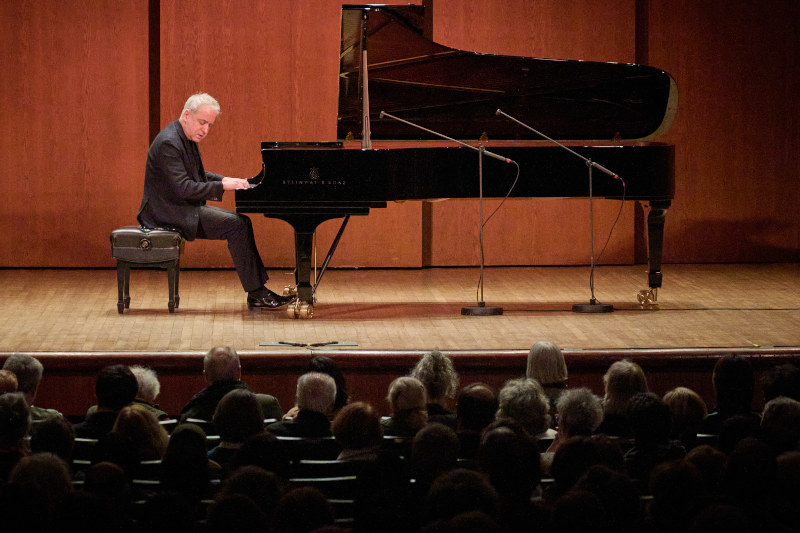
all photos: Joseph Sinnott for 92nd St Y
Jeremy Denk, one of our leading classical pianists, winner of a MacArthur fellowship and the Avery Fisher Prize, originally dismissed the gnarly genius Charles Ives as “the crazy uncle of American music, weaving familiar tunes—hymns, ragtime, marches—into unsettling quilts.” But over time Denk has evolved into one of the composer’s most discerning interpreters, and on Thursday night at the 92nd Street Y’s Kaufmann Concert Hall he gave a thrilling and moving account of the monumental second piano sonata, Concord, Mass., 1840–60, preceded by a thoughtfully curated program of two Beethoven sonatas (Opus 90 and Opus 110) bookending Scott Joplin’s “Bethana, A Concert Waltz,” Louis Moreau Gottschalk’s “The Banjo,” William Bolcom’s “Graceful Ghost” rag (substituting for the previously-announced “Poltergeist”), and an arrangement by the great jazz pianist Nina Simone of Jule Styne’s “Just in Time” from the musical Bells Are Ringing.
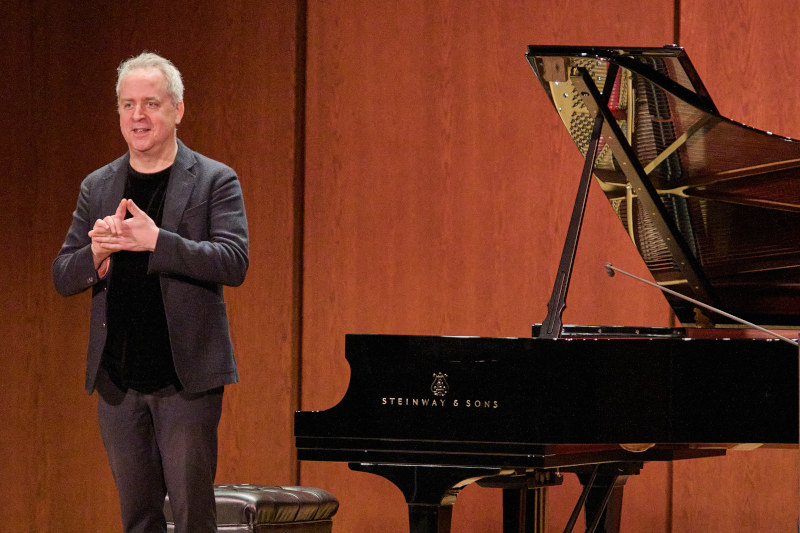
Denk is a contextualist who excels in exploring connections between disparate artists and eras, and the opening half of this recital was the set-up: It acknowledged Ives’s debt to that earlier revolutionary, Beethoven, whose Fifth Symphony is quoted in the Concord, highlighting dynamic and emotional contrasts in the two sonatas — the tumultuous first movement and the lyrically pastoral second movement of the Opus 90, the singing first movement and the poignant and introspective second and third movements of the Opus 110 — that seemed to prefigure Ives’s turbulent soundscape. It nodded at Ives’s sometimes raucous, sometimes tender use of American 19th century popular forms with elegant and unexpectedly inflected interpretations of the elegiac Joplin, the glitteringly syncopated Gottschalk, and the whimsical, haunting Bolcom. And with Nina Simone’s marvelously eccentric mashup of jazz, baroque, and Broadway, it prepared the way for Ives’s inclusive embrace of high and low, sometimes in the same phrase.
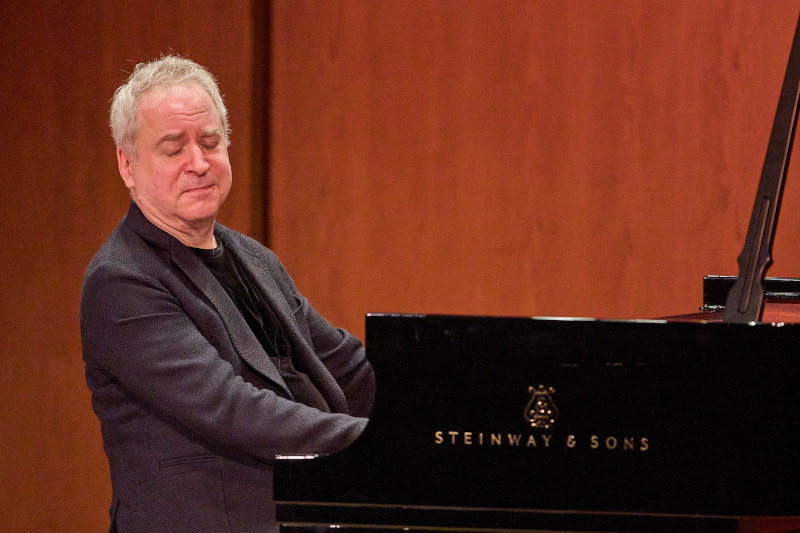
So when, after the intermission, Denk took his seat on the bench for the 45-minute Concord, his audience was ready, and Denk did not disappoint. The sonata, which Ives began drafting early in the 20th century and kept revising even past its publication (in 1920) and first public performance (in 1938), is famously difficult, sprawling in structure and full of complex, dissonant chords that America’s other crazy uncle, Walt Whitman, might have described as a “barbaric yawp.” The piece evokes the 19th century Transcendentalist writers — Ralph Waldo Emerson, Nathaniel Hawthorne, philosopher Bronson Alcott and his novelist daughter Louisa, and Henry David Thoreau — after whom the four movements are named; but its grand ambition is to make an integrated statement of the composer’s own philosophy of life. To give the music the rhythm of prose, Ives has written many sections without bar lines, and avoided specific notations about tempo or dynamics. In the “Hawthorne” movement there are “tone clusters,” to be produced by pressing on the black keys with a piece of wood the length of a ruler. And instead of introducing a theme, then complicating and resolving it, the sonata begins with “what seems like chaos” (as Denk has described it) before gradually drawing its theme out of a welter of motifs.
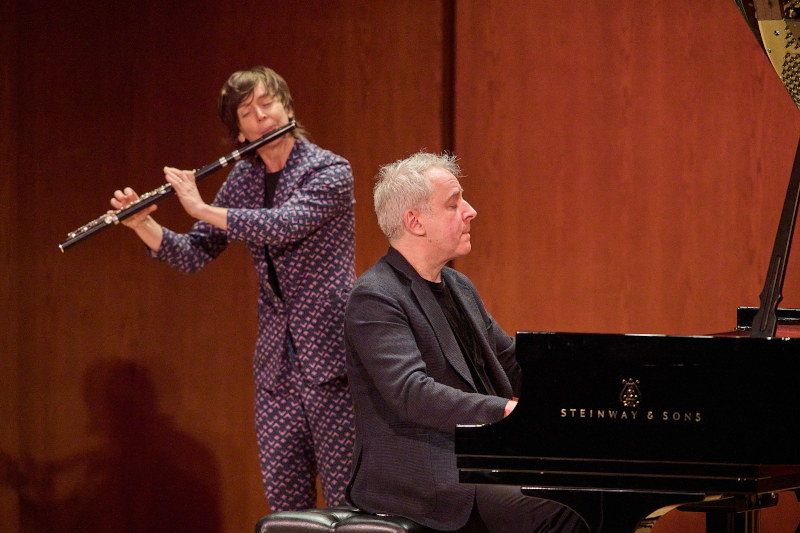
Denk (whose new album, Ives Denk, has just been released by Nonesuch) met all these challenges, plunging assertively into the introductory “Emerson” section of the piece, then turning to quicksilver virtuosic syncopation in “Hawthorne.” With “The Alcotts” he delicately laid bare the beating heart of the sonata, a hymn tune Ives called “the human faith melody”; finally, in “Thoreau,” after pianistically wandering through the woods to Walden Pond, he was briefly joined onstage by the flutist Clare Chase, who hauntingly reprised the hymn tune before drifting away, leaving Denk to bring the movement, and the sonata, to a meditative and profoundly moving close. For a moment after the last note died away he remained motionless on the bench, his hands barely resting on the keys, as if reluctant to leave them — and the house burst into applause.
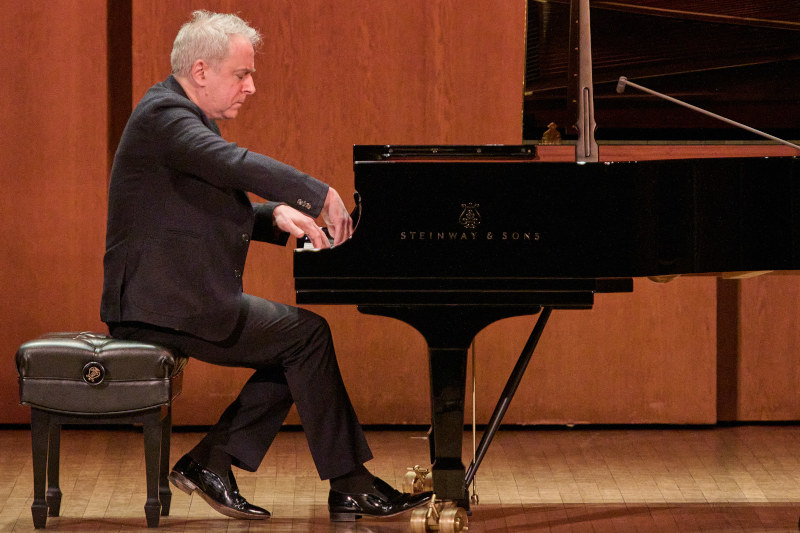
“I am large, I contain multitudes,” Walt Whitman said in Leaves of Grass; and that’s what Jeremy Denk showed us about Charles Ives on Thursday. “Ives is not the easiest man or composer to love,” the pianist has written. “But the animating idea [of his music] is generous: a restless search to find more in America than we thought, or even hoped, to find.”
Amanda Vaill is a best-selling and award-winning biographer, journalist, and screenwriter with a focus on history, arts, and culture. Her next book, Pride and Pleasure: The Schuyler Sisters in an Age of Revolution, will be published in October 2025.
Kaufmann Concert Hall
92nd Street Y
1395 Lexington Avenue, New York, NY
December 12, 2024
Joplin, Bethena
Gottschalk, The Banjo
Jule Styne, “Just in Time” (arr. Ethan Iverson, after Nina Simone)
William Bolcom, The Poltergeist Rag, from Three Ghost Rags
Beethoven, Sonata No. 31 in A-flat Major, Op. 110
Beethoven, Sonata No. 27 in E Minor, Op. 90
Ives, Sonata No. 2, “Concord, Mass., 1840–60”
